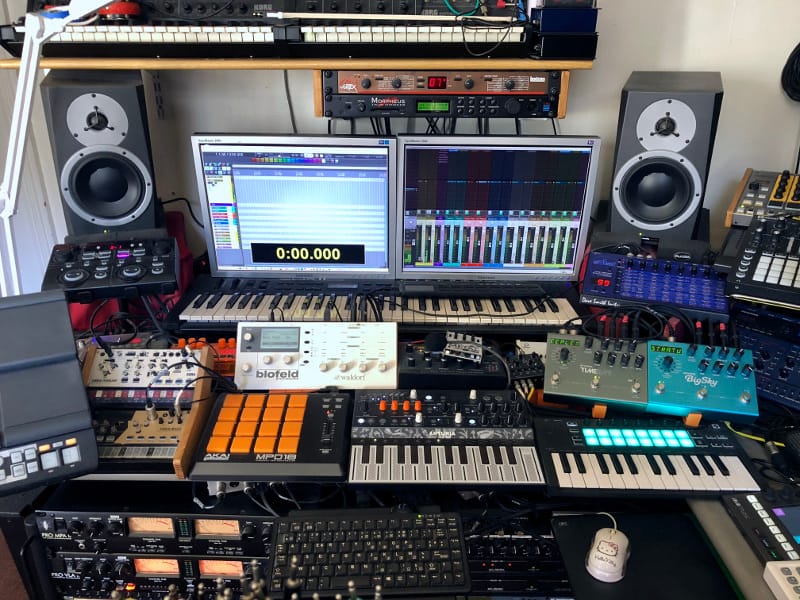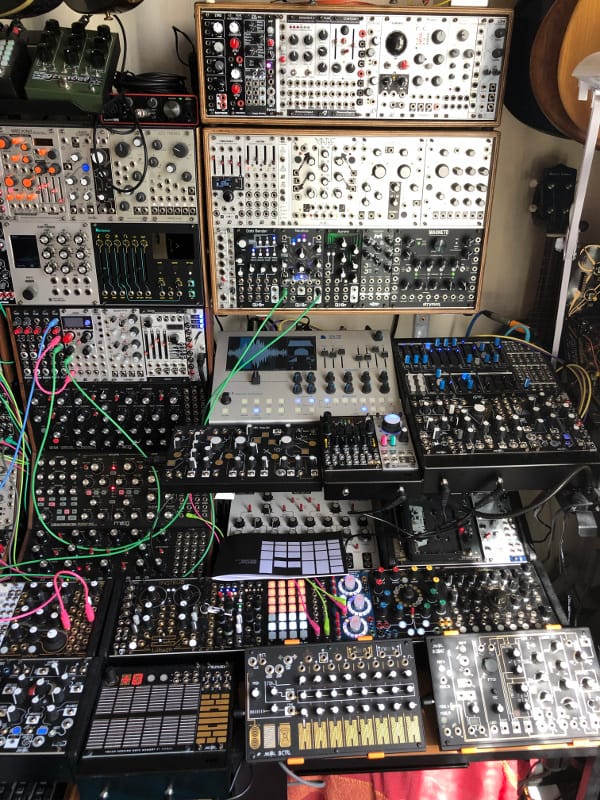- G.A.S. Newsletter
- Posts
- 92 - Trucks and Coyotes
92 - Trucks and Coyotes

Artist Interviews 🎶 Studio Tours 🎛
Hello music people 👋
Today in the spotlight, Trucks and Coyotes
Coming from France, he has an inspiring story to tell. An optimist making gloomy music, using limited hardware that unleash his creativity 🎶
Read Time: 12 minutes 📰
Studio










Gear List
Modular system – 2110HP
Soma - Lyra
Leaf Audio - Sounbox (highly modified)
Make Noise
0-Coast
0-Ctrl
Strega
Yamaha
Korg
MS-10
MS-20
SQ-10
Prophecy
Waldorf - Blofeld
Dave Smith
Tetra
Evolver
Arturia - Microfreak
25 electric guitars, 1 lapsteel
2 acoustic guitars
1 bass guitar
Lots of pedals and 19” gear
You can support G.A.S. Newsletter
If you’re enjoying these studio tours & interviews, chances are your friends will enjoy them too. Help me reach more readers, and grow this community, by sharing this issue:
Interview
Who are you and what is your relationship with music?
My name is Yann, making music under the name of Trucks and Coyotes, which was given by my girlfriend to a trip hop track I made a long time ago.
I’m 64 and I live in Paris (France). Music as always been a hobby. I had a day job, and retired two years ago.
I started playing electric guitar when I was 16 or so. In 1978, I bought my first synths, Korg MS10, MS20. I still have them. With my best mate, we were playing highly distorted guitars, and since we did not have permanent bass player and drummer, we replaced them by the Korgs and SQ10 sequencer. We were making industrial music, without knowing it.
After that, came a long bedroom music period: Roland MC sequencer, replaced by Atari 1040 with Cubase and multitrack cassette recorder, and finally Cubase on PC, now replaced by Reaper. I also started to buy hardware synths and effects.
It has been a disappointing experience. Lack of time, music software ergonomy, lack of skill for putting together multitrack recording, discouraged me and I have only a small number of finished tracks, which are terrible when I listen to them today.
When Moog M32 and DFAM were released, I decided to give them a try. What a revelation! I was back to my early Korg era.
Then I discovered Hainbach and his Youtube channel. Second revelation: ambient music made in a mad scientist lab was definitely what I would like to do.
I was starting to prepare my retirement and started to add modules to the Moogs. The rabbit hole was not far away.
I finished to build my modular system with one part of my retirement bonus. This is more or less what can be seen on pictures. I still use hardware synths to feed the modular with small sequences or pads. I stay away from Midi. Enough is enough.
I took an online course dedicated to modular, which helped me to start, because even if you know hardware synths, modular has some particularities which may not be obvious for the beginner.
Third revelation were Modular World shows on Youtube. I discovered people making music like me, but much more talented and experienced. This pushed me to work and progress. I had in mind to be on the show one day. This happened for the second anniversary in May 2022. I’ve been so happy to get positive feedback to my set. Thank you Johno Wells!
My studio is fairly crowded because I have never sold anything and collect guitars. I like buying second hand guitars at low price and refurbish them. I believe that I would be a decent guitar tech. I only have a small space because if you want to stay in Paris, you have to get a small flat, due to high level rents. Our main room is divided in two: One half for me and music, the other half for my partner and her painting activities.
Which piece of equipment in your studio is essential to your production process?
1010 Bitbox Mk2 sampler and granular modules. My favorite being Instruo Lubadh.
Also my 8 tracks faderbox.
What is the least expensive piece of gear that gave you the most results?
My highly modified Leaf Audio soundbox.
A great part of textures and percussions I use comes from it. I sample and manipulate with granular modules like Nebula or Lubadh.
Walk us through your process for creating and producing music.
I generally start with a texture sample, process it with granular, until I find something interesting to go further. Then I choose one or several oscillators and start to experiment with sequencers. I also use a lot stochastic sequences.
Afterwards, I add bass and bass percussion sounds, and I check that both do not cover each other. Then comes light percussions, often samples. Effects come at the end.
This is the process as I can analyze it right now. But most often I don’t even remember how I started one track. I don’t write any notes, and un-patch everything when I’m done with recording. I love starting from scratch.
I always used a clocked tempo from Pamela, but I often use 7/8 or 5/8 signatures.
What is a production technique that you always come back to?
After rehearsing quite a lot, I record on-the-fly in stereo in Reaper or Zoom H6, and never apply post-treatment. You have to learn to live with mistakes or imperfect parts. It is like when you draw directly with ink: no correction possible. It is a liberation after losing so much time trying to put multitrack songs together, without getting at least a demo quality. At the end, it is what it is, but its done. Then, you un-patch, and you can go for another one.
It is like playing live. Of course you have to take care of levels, rehearse transitions, etc.
When I record, all the parts are playing in background. I bring them into action using my 8 tracks faderbank, and sometimes Planar module. I don’t use mutes. The faders control either level, or low pass filter cutoff, depending of the sound. This allows me to do smooth transitions. I may also change patterns in OxyOne or Eloquencer as they stay in sync with tempo.
How would you describe your style?
Gloomy is not a recognized style, so let’s say dark ambient. In general, I never have played joyful music…
Before going modular, I was into delta blues guitar, which is also pretty dark and pessimistic…
It’s funny because I am an optimistic person, with a sense of humor which helps me to overcome even bad situations…
What is a big challenge you have as an artist?
Enlarging my audience, not to gain a celebrity status of course, but to get a little more feedback. Probably, I don’t involve myself enough in social medias. But with more than 100 followers on Instagram, nearly all musicians, I was hoping more plays on Bandcamp.
My dream would be also to collaborate on short film projects or theatre. But for that, I’m missing a substantial number of releases.
Has building a hardware setup changed your perspective on music or life in general?
Going back to hardware and specially modular unlocked my ability to finish and publish tracks. After all these disappointing experiences with computer music, I found again the pleasure I had with my MS10-MS20 back in my young days.
Modular systems may seem complicated. They are not. It is just because you have right in front of you what is hidden in endless menus and sub-menus in computer software and some hardware synths. You have knobs and connections right on hand. You change your mind, or want to try something else: just change your patch.
One tip on how to spark creativity?
As far as electronic music with modular is concerned, I don’t believe in “inspiration”.
Fire your system and let your instinct lead you. Experiment, go backwards, change patching etc. It is so much easier compared with using a DAW, or even hardware synths.
Make your own sounds and use your own samples.
You will see that ideas come ten time faster than when using presets or sample banks. You will not lose time browsing your zillion items library to find something to work with. You will go right into it, and you will be proud of using your own sounds. It will be your creation from A to Z.
Sorry for the people which make a living by producing such libraries. One exception should be film music probably, and pro musician with tight deadlines.
A book, movie, article, or album that has inspired you?
Modular World shows, Coil, Bords of Canada, Rick Rubin
Do you have a question in mind that you think I should have asked?
25 electric guitars and no guitar in your current music. Why?
I love guitar drones made by some ambient artists (Anne Sulikowski for example). But I’m not able to move beyond my play style I used for decades. So, I still play blues guitar for my pleasure only. You need to keep playing at least to avoid losing finger calluses…
Where can people find more of your music and connect with you online?
In Case You Missed It
This issue is brought to you by
Follow to see in-studio videos from the featured artists 🎛️🎚️
As a means to support G.A.S. Newsletter, affiliate links might be included in the issue. If you make a purchase through them, I get a commission with no extra cost to you.

Giannis @giannis.kampiotis



Reply